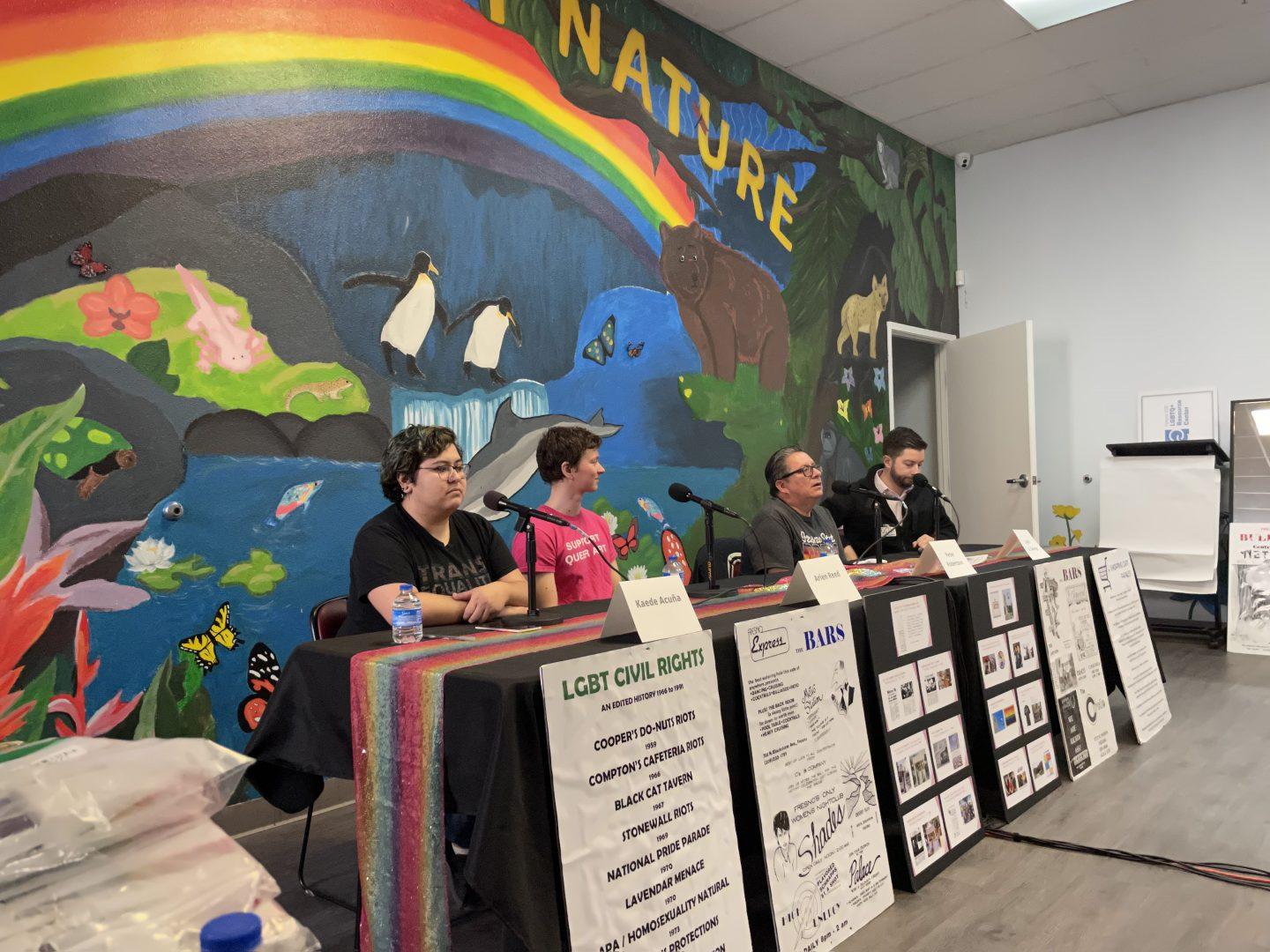Qistory invited educational leaders, Fresno State alumni and students to discuss the inclusion of LGBTQ+ students and organizations within Fresno schools for its final community panel of the year, “Pride on Our Campuses.”
Qistory is a project of the nonprofit Community Link that aims to document, record and store local LGBTQ+ history. It recorded the panel of four local educational leaders at the Fresno Economic Opportunities Commission’s (EOC) LGBTQ+ Resource Center as part of its mission.
Qistory committee member Chris Jarvin moderated the panel. It included Fresno State’s director of alumni connections, Peter Robertson; artist, president and co-founder of Fresno City College’s (FCC) Allied Staff and Faculty Association, Arien Reed; veteran, Fresno Pacific University alumnus and former president of Birds for Pride, the campus’ LGBTQ+ club, Justin St. George; and regional organizer of the Genders and Sexualities Alliance (GSA) Network of California, Kaede Coronado-Acuña.
Beginning with Fresno State, panelists discussed the origination of LGBTQ+ organizations on their campuses and their reception.
Robertson, founding member of the Gay Lesbian Student Alliance (GLSA) at Fresno State in the fall of 1987, detailed the discrimination that followed the club’s inception, including the burning of the club’s booth and multiple instances of vandalism and harassment from the Ku Klux Klan.
Despite the hardships the club faced, it persevered and recently celebrated its 35-year anniversary under a new name, United Student Pride (USP). Acceptance toward the LGBTQ+ community has expanded on campus in other ways as well.
Fresno State’s rainbow graduation ceremony has grown, with 90 students signing up last year. Fresno State has also raised the rainbow flag on campus for Pride Month the last two years.
Reed discussed his work to create an LGBTQ+ staff organization at FCC, which was officially established in January 2019.
Since its creation, the organization has worked to address issues with incorporating all-gender restrooms on campus and advocating for the construction of more bathrooms in general.
“We can’t wait another few years [on this issue.] We need to use the restroom now, and we don’t have restrooms. You try going to school all day and never using a restroom,” Reed said.
He pointed out that while students are legally allowed to use which restroom they feel most closely identified with, many students still experience pushback or discomfort in doing so. FCC in particular, he argued, already struggles to provide adequate restrooms for students, with only six restrooms across 42 buildings.
Coronado-Acuña, who goes by they/them pronouns, agreed that many campus GSAs are finding that students are calling for gender neutral restrooms in particular, as well as inclusive sex education.
They attended local LGBTQ+ organizations through their youth, crediting the support through their transition and two-week experience with homelessness after coming out to their mother.
Coronado-Acuña emphasized that LGBTQ+ youth who are struggling or looking for a way to join their local LGBTQ+ community can and should start their own GSA clubs at their schools.
“Start with your GSA. Hopefully, there is a GSA on your campus already. If not, start one. We’re, I feel like, the first line of defense,” they said.
St. George said that growing up, he did not experience much discrimination for his sexuality, even when serving with the Navy’s largest aviation reconnaissance squadron for several years. It was after his honorable discharge and the decision to use his GI Bill at Fresno Pacific University (FPU) that he experienced discrimination toward the LGBTQ+ community.
“I realized in the clubs page there’s … a lot of diverse clubs. Then I thought, wait a minute, there’s no pride club on here. That’s kind of weird, it’s 2020, 2021. That should be automatic, you know? And you can see how naive I am, and what my experience up until this point in the world [was] again,” St. George said.
As a faith-based institution, FPU was exempt from Title IX, according to St. George, leading to discrimination in employment, housing, athletics and more.
St. George emphasized this exemption as a defining characteristic of the culture of the institution, which he said sent his club proposal to the Board of Trustees, which rejected the club with a statement saying it didn’t align with the university’s statement of faith.
The club was able to eventually form under the name Birds for Pride, and while they were not able to meet on campus last year, St. George noted they are able to do so this semester.
Panelists concluded with advice for students.
“I think surrounding yourself with people that support you and people that love you will help you navigate spaces in life. For me that’s been a recipe for success,” Robertson said.
The free event was supported by Fresno State’s LGBT+ Allies and the Women, Gender and Sexuality Studies department, among other community sponsors. Further potential Qistory panels will be announced on social media accounts and its website.




